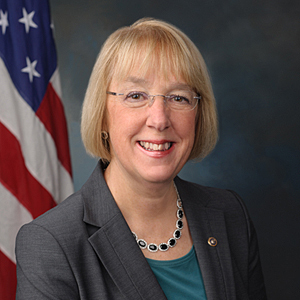Senators ask EPA to increase RVOs for advanced biofuel, biodiesel

August 23, 2018
BY Sen. Patty Murray's office
Aug. 23, U.S. Sens. Patty Murray, D-Wash.; Roy Blunt, R-Mo.; Heidi Heitkamp, D-N.D.; and Chuck Grassley, R-Iowa, led a bipartisan group of 35 other senators urging the U.S. EPA to increase volume obligations for biomass-based diesel and advanced biofuel and ensure any small refiner economic hardship exemptions are appropriately accounted for in its final rule for the Renewable Fuel Standard. The EPA’s June 2018 proposal would raise the biomass-based diesel volume for 2020 to 2.43 billion gallons and increase the advanced biofuel volume for 2019 to 4.88 billion gallons.
“While these proposed increases are encouraging, these volumes continue to underestimate the existing potential of the biodiesel and renewable diesel industries in our states,” the senators wrote. “We believe the biodiesel industry can do more and that EPA should demonstrate more confidence in the RFS program’s ability to drive growth. Increasing biomass-based diesel and advance biofuel volumes would encourage investment in capacity and new fuel development. Further, EPA must accurately account for small refiner economic hardship exemptions in the final rule. … It is critical that EPA appropriately account for any small refiner economic hardship exemptions that it reasonably expects to grant during the 2019 compliance year in the final rule, or EPA will not be able to fulfill its duty to ensure RVOs are met.”
Advertisement
Advertisement
As the senators noted in their letter, every 500 million gallon increase in biodiesel production supports an estimated 16,000 jobs.
The senators continued, “We have made great progress through the RFS in diversifying our nation’s fuel supply while creating and sustaining jobs, strengthening local economies, generating tax revenues, and improving energy security. We urge you to continue to increase annual RVOs for biomass-based diesel and advanced biofuels and to ensure that, once set, the annual RVOs are fully met.”
In addition to Murray, Blunt, Heitkamp, and Grassley, the letter was signed by U.S. Sens. Tammy Baldwin, D-Wisc.; Richard Blumenthal, D-Conn.; Sherrod Brown, D-Ohio; Maria Cantwell, D-Wash.; Bob Casey, D-Penn., Susan Collins, R-Maine; Catherine Cortez Masto, D-Nev.;, Joe Donnelly, D-Ind.; Tammy Duckworth, D-Ill.; Dick Durbin, D-Ill.; Joni Ernst, R-Iowa; Dianne Feinstein, D-Calif.; Deb Fischer. R-Neb.; Maggie Hassan. D-N.H.; Mazie Hirono, D-Hawaii; John Hoeven, R-N.D.; Angus King, I-Maine; Amy Klobuchar, D-Minn.; Patrick Leahy, D-Vt.; Ed Markey, D-Mass.; Claire McCaskill, R-Mo.; Jeff Merkley, D-Ore.; Jerry Moran, R-Kan., Chris Murphy, D-Conn.; Gary Peters, D-Mich.; Jack Reed, D-R.I.; Pat Roberts. R-Kan.; Bernie Sanders. I-Vt.; Jeanne Shaheen, D-N.H.; Tina Smith, D-Minn.; Debbie Stabenow, D-Mich.; John Thune, R-S.D.; Elizabeth Warren, D-Mass.; Sheldon Whitehouse, D-R.I.; and Ron Wyden, D-Ore.
Advertisement
Advertisement
Related Stories
The U.S. Energy Information Administration maintained its forecast for 2025 and 2026 biodiesel, renewable diesel and sustainable aviation fuel (SAF) production in its latest Short-Term Energy Outlook, released July 8.
XCF Global Inc. on July 10 shared its strategic plan to invest close to $1 billion in developing a network of SAF production facilities, expanding its U.S. footprint, and advancing its international growth strategy.
U.S. fuel ethanol capacity fell slightly in April, while biodiesel and renewable diesel capacity held steady, according to data released by the U.S. EIA on June 30. Feedstock consumption was down when compared to the previous month.
XCF Global Inc. on July 8 provided a production update on its flagship New Rise Reno facility, underscoring that the plant has successfully produced SAF, renewable diesel, and renewable naphtha during its initial ramp-up.
The U.S. EPA on July 8 hosted virtual public hearing to gather input on the agency’s recently released proposed rule to set 2026 and 2027 RFS RVOs. Members of the biofuel industry were among those to offer testimony during the event.
Upcoming Events










